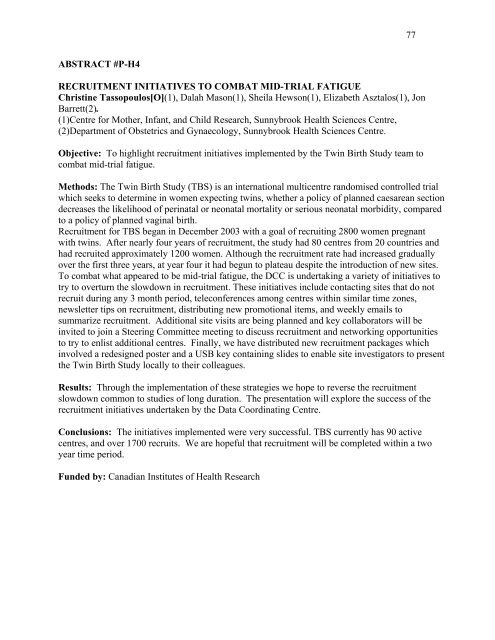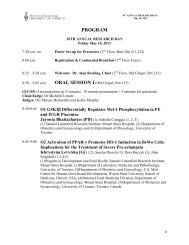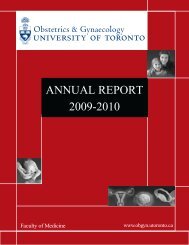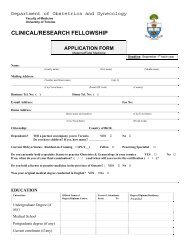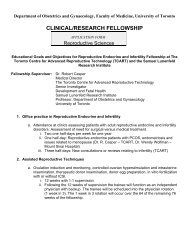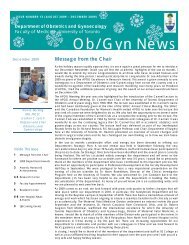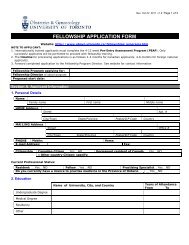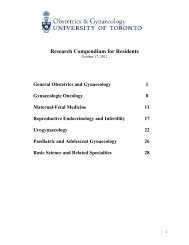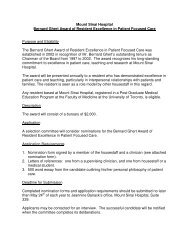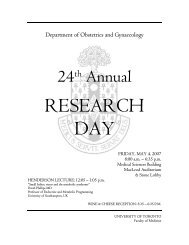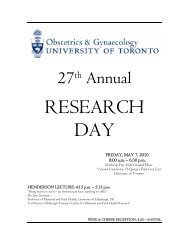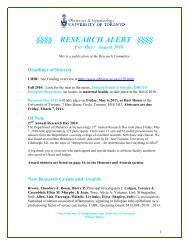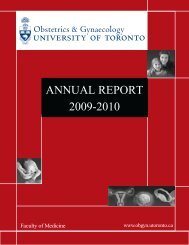research day - University of Toronto Department of Obstetrics and ...
research day - University of Toronto Department of Obstetrics and ...
research day - University of Toronto Department of Obstetrics and ...
Create successful ePaper yourself
Turn your PDF publications into a flip-book with our unique Google optimized e-Paper software.
77<br />
ABSTRACT #P-H4<br />
RECRUITMENT INITIATIVES TO COMBAT MID-TRIAL FATIGUE<br />
Christine Tassopoulos[O](1), Dalah Mason(1), Sheila Hewson(1), Elizabeth Asztalos(1), Jon<br />
Barrett(2).<br />
(1)Centre for Mother, Infant, <strong>and</strong> Child Research, Sunnybrook Health Sciences Centre,<br />
(2)<strong>Department</strong> <strong>of</strong> <strong>Obstetrics</strong> <strong>and</strong> Gynaecology, Sunnybrook Health Sciences Centre.<br />
Objective: To highlight recruitment initiatives implemented by the Twin Birth Study team to<br />
combat mid-trial fatigue.<br />
Methods: The Twin Birth Study (TBS) is an international multicentre r<strong>and</strong>omised controlled trial<br />
which seeks to determine in women expecting twins, whether a policy <strong>of</strong> planned caesarean section<br />
decreases the likelihood <strong>of</strong> perinatal or neonatal mortality or serious neonatal morbidity, compared<br />
to a policy <strong>of</strong> planned vaginal birth.<br />
Recruitment for TBS began in December 2003 with a goal <strong>of</strong> recruiting 2800 women pregnant<br />
with twins. After nearly four years <strong>of</strong> recruitment, the study had 80 centres from 20 countries <strong>and</strong><br />
had recruited approximately 1200 women. Although the recruitment rate had increased gradually<br />
over the first three years, at year four it had begun to plateau despite the introduction <strong>of</strong> new sites.<br />
To combat what appeared to be mid-trial fatigue, the DCC is undertaking a variety <strong>of</strong> initiatives to<br />
try to overturn the slowdown in recruitment. These initiatives include contacting sites that do not<br />
recruit during any 3 month period, teleconferences among centres within similar time zones,<br />
newsletter tips on recruitment, distributing new promotional items, <strong>and</strong> weekly emails to<br />
summarize recruitment. Additional site visits are being planned <strong>and</strong> key collaborators will be<br />
invited to join a Steering Committee meeting to discuss recruitment <strong>and</strong> networking opportunities<br />
to try to enlist additional centres. Finally, we have distributed new recruitment packages which<br />
involved a redesigned poster <strong>and</strong> a USB key containing slides to enable site investigators to present<br />
the Twin Birth Study locally to their colleagues.<br />
Results: Through the implementation <strong>of</strong> these strategies we hope to reverse the recruitment<br />
slowdown common to studies <strong>of</strong> long duration. The presentation will explore the success <strong>of</strong> the<br />
recruitment initiatives undertaken by the Data Coordinating Centre.<br />
Conclusions: The initiatives implemented were very successful. TBS currently has 90 active<br />
centres, <strong>and</strong> over 1700 recruits. We are hopeful that recruitment will be completed within a two<br />
year time period.<br />
Funded by: Canadian Institutes <strong>of</strong> Health Research


